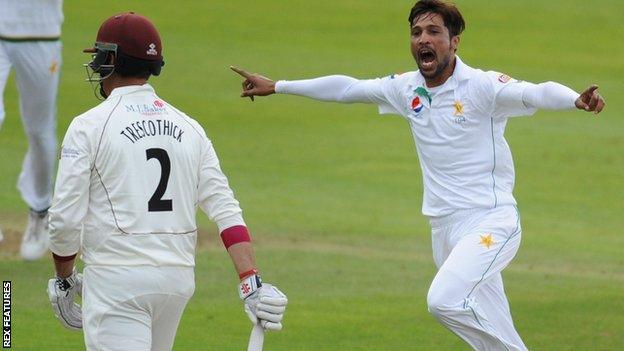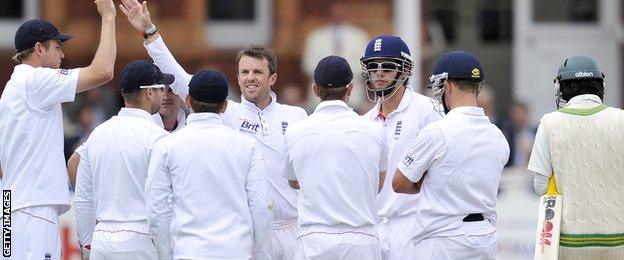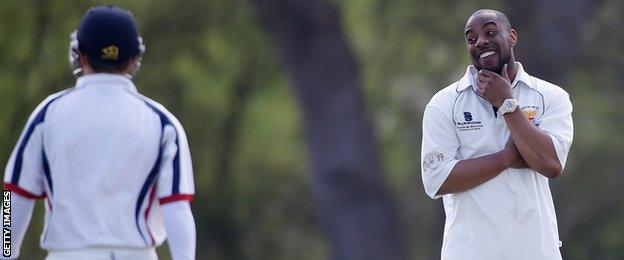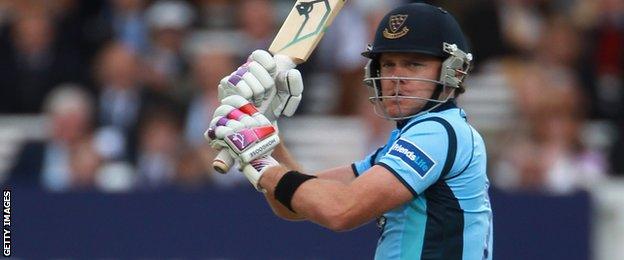Mohammad Amir & Mervyn Westfield: Could you play with a spot-fixer?
- Published

Mohammad Amir played against Somerset last week - his first game in England since 2010
Everyone deserves a second chance, right?
In fact, when it comes to second chances, sport can be incredibly generous.
Carlos Tevez helped Manchester City win the Premier League after three months of unauthorised leave in Argentina, while jockey Lester Piggott returned to success in the saddle following three years in jail for tax fraud. Countless others have won medals after drugs bans.
But how easy is it to forgive when you have been directly wronged? When it comes to fixing, how gracious could you be to the man who has deliberately betrayed you and your team for a quick buck?
As Pakistan fast bowler Mohammad Amir prepares to play in a Lord's Test against England this week, six years after spot-fixing at the same venue, BBC Sport spoke to those directly affected by corruption and asked if they could play with a returning fixer.
The opponent - 'I'd like to say I'd refuse to play'
Former England off-spinner Graeme Swann played in the 2010 Lord's Test, where the spot-fixing of Amir, Mohammad Asif and Salman Butt took place. Swann took nine wickets in the match, while team-mate Stuart Broad made 169, his only Test century.
Swann: "I knew I was bowling really well at the time and felt like I deserved those results. No matter how well I bowled in that match, it will forever be tarnished with a black mark hanging over it.
"Stuart Broad was aghast when there was talk of the result not standing. He said, 'Oh my god, they're not going to take the names down off the honours board, are they?' Thankfully, it did stand."

Swann (centre) celebrates taking the wicket of Mohammad Amir (right)
Amir, Asif and Butt served jail sentences and completed the bans handed to them by the International Cricket Council. Butt is playing domestically in Pakistan, while Asif is trying to rebuild his career in Norway.
But it is the comeback of Amir, who was only 17 at the time, that has attracted most attention. Returning to international cricket in January, he played in the World Twenty20 and is now set for his first Test since 2010 at the venue where he played his last.
Swann: "I was glad when they got punished. Now I'm aghast they have been given the chance to play again.
"The notion that every man deserves a second chance is absolute nonsense. In sport, where you know full well what you're doing - tarnishing the game, ruining it for millions of people - then you shouldn't get another crack at that.
"There are certain jobs you can't do with a criminal record. Once trust is gone, how do you win that back?
"Every time someone buys a ticket, they are putting their trust in what is delivered on the field is above board. Every dodgy run-out is going to hang over them."
From the England team that played in 2010, Alastair Cook, Broad, James Anderson and Steven Finn remain in the squad for the first Test of this series, which begins on Thursday.
Swann: "It's very hard to say how I would react if I had to play against them now. Ideally, sitting on my pedestal, I'd like to say I'd refuse to play. The question is far bigger than that for the players because the authorities have cleared them.
"I'd at least make a statement, come out and say this guy shouldn't be playing.
"I feel terribly sorry for the players that might have to come up against them. The likes of Broad, Alastair Cook, and James Anderson shouldn't have to come up against these opponents again."
The coach - 'I would welcome him back'
Paul Grayson was Essex coach when fast bowler Mervyn Westfield deliberately under-performed in a one-day match against Durham in 2009. Westfield was encouraged to spot-fix by Essex overseas player Danish Kaneria, who was banned for life.
Grayson: "I had a lot of sympathy for Mervyn because he was a very talented cricketer coming through the ranks. He was just finding his way at Essex and that was taken away from him.
"I felt let down by Danish. I had such a good relationship with him that part of me didn't want to believe it, but we had to find ways of getting over it.
"It was a really difficult situation for everyone in the group. There was quite a lot of anger from senior players towards Danish for taking Mervyn down.
"It took the group a long time to get over it. The club took a lot of stick of it, the majority of which was unfair. It was said we brushed some of it under the carpet, which was certainly not the case. We tried to deal with it the best way we could."

Mervyn Westfield (right) returned to club cricket in 2014
Westfield was banned for five years, but was allowed to play club cricket in 2014 and has been given a dispensation to play minor counties cricket for Suffolk in 2016 ahead of his first-class ban expiring next year.
Grayson: "In Meryvn's case, I would have been happy to welcome him back. He made a mistake, but he put his hands up and he's gone through the process. He knows that he did wrong.
"Danish is a different case. This is a senior player who knew what was going on.
"I can see why players would be reluctant to welcome someone back. It's all down to the individual. You'll always have a few that wouldn't want him back and would take some winning over.
"As a coach, you'd have to find out the ones who had an issue and get them in a room together to discuss these things. You don't want resentment; you don't want five or six lads not talking to each other.
"You'd have to get the acceptance of the group. You'd have to speak to the senior players first because they are the powerful figures in the dressing room. If you got clearance from the senior players, the younger lads would buy into that."
The team-mate - 'I just can't see it working'
Joe Gatting was in the Sussex side that contained Lou Vincent and Naved Arif,, external who were found guilty of fixing a one-day match against Lancashire in 2011.
Gatting: "A lot of teams I have been involved with have values that they live by and trust is always number one. I'm not sure how comfortable I'd be sitting in a team with a guy that has been convicted - it just wouldn't work. A lot of guys would always have that doubt in their head, maybe even taking focus off the game.
"You want to look around a changing room and think you have 11 good guys that will give their all to win a game. If you haven't got that, I just can't see it working.
"I don't think I can imagine any circumstances where I would be more comfortable with it. I'd rather have someone in my team who will give 100% than a world-class player who has fixed.
"I'd be very confident to say that most guys would feel the same because a sports team wants everyone pushing in the right direction."

Lou Vincent played county cricket for Lancashire, Northamptonshire, Sussex, Worcestershire
Vincent and Arif were both banned for life, but Gatting, currently without a club after being released by Hampshire, could, in theory, encounter the likes of Westfield or Amir in county cricket.
Gatting: "It's a privilege to play. There are thousands and thousands of kids who would love the opportunity to play professional cricket at whatever level. If you are lucky enough to get in that position and then you decide you are going to fix, you're taking away the chance of someone who is trying their hardest for an opportunity.
"There are guys out there who want that opportunity, but some are getting a second chance. I'm not sure how that's fair on the sport. They are giving people a second chance when they shouldn't have that opportunity."
The fixers - 'The emotional side took its toll'
Amir was booed by a crowd in New Zealand when he made his Pakistan comeback in January, while England captain Cook says there is likely to be a "reaction" from the Lord's crowd this week.
Earlier this year, Westfield said he expected a "bit of banter" as he stepped up his return.
Herschelle Gibbs, the former South Africa batsman, returned to have a successful international career following a six-month ban for his involvement in fixing.
Gibbs: "I was very nervous and emotional. Luckily I still had the support of the majority of South Africa and, more importantly, my team-mates.
"I do remember the first Test against Sri Lanka - they made a point of reminding me. I couldn't really focus on my batting. I think I got a duck anyway. It wasn't easy. It was a difficult year or two after everything unfolded.
"After the six months away I was excited to come back. I had a lot energy and I was very chirpy, but the emotional side took its toll.
"My family and friends gave me the most support. They are the closest people to you. I've been on the road for most of my life, so I took it on the chin and carried on trying to make runs and doing my bit for the team."
While many - including Kevin Pietersen, Muttiah Muralitharan and Michael Vaughan - have called for spot-fixers to be banned for life, former England captain Michael Atherton has backed Amir and the Professional Cricketers' Association has championed Westfield's cause., external
In BBC Sport's small sample, Grayson presented the balanced approach of a coach used to gelling a dressing room of differing characters in order to produce a harmonious team.
However, if Swann or Gatting at all speak for the majority of professionals, then returning fixers have a huge job in winning over their team-mates and opponents.
A version of this article first appeared on the BBC Sport website in February 2016.
- Published4 July 2016

- Published29 January 2015

- Published26 August 2015

- Published15 May 2018

- Published18 October 2019
